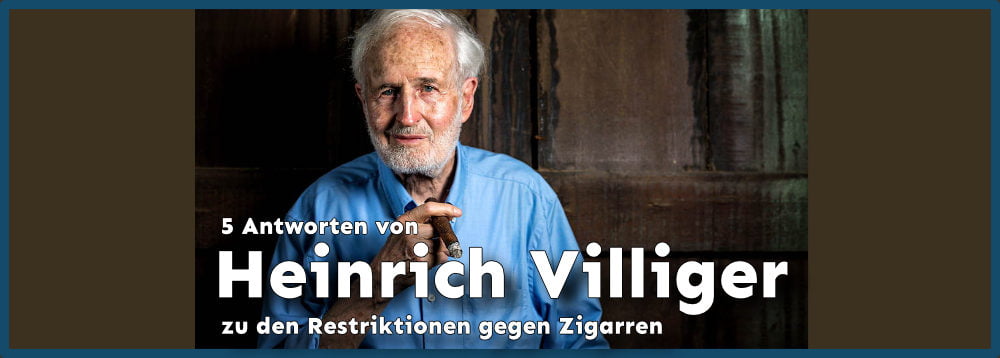
Heinrich Villiger and 5 cigars answers
Heinrich Villiger and 5 cigars answers: At the beginning of 2021, I sent Heinrich Villiger 5 questions on the subject of "laws against cigars". Heinrich Villiger is a living cigar legend. To complement this post, and that you can get to know Heinrich Villiger a bit, I have a nice trivia for you: After his 5 answers you will also find a film I produced for the 30th anniversary of "5TH Avenue Products Trading-GmbH".
In response to my interview request, he replied, "Dear Vasilij, I'm happy to answer your 5 questions - from my perspective - as follows."
Why does the WHO want to destroy the tobacco industry? The countries collect taxes every year, that would fall away.
The WHO - World Health Organization - is a worldwide organization for the protection of the health of mankind. If I'm not mistaken, the WHO has about 100 member countries that finance this Geneva-based organization. The latest news before the new US President "Biden" is sworn in: The U.S., or Trump, recently stopped making payments to the WHO because he is not satisfied with its performance. The WHO rates tobacco use as the greatest preventable cancer risk - lung cancer as a result primarily of cigarette smoking. This, of course, is also realized by the cigarette industry, which in recent years has launched a very large number of "alternative products" on the market, which are no longer burned, but "vaporized" with less (or no) residues harmful to the lungs.

Since these products are not tobacco products, they cannot be taxed as tobacco products. Here the opinions of the industry on the one hand and the tax authorities on the other hand are not in agreement - the states cannot do without the tobacco taxes. In Germany - just as an example - the tobacco tax on cigarettes alone amounts to one billion EURO per month.
What powerful lobby is behind this?
There are two parties, on the one hand the state and on the other the cigarette industry, which has developed these new "alternative products" itself. The arguments of the cigarette industry and also other manufacturers: these new products are less harmful and therefore should not be taxed as well.
There are allegations that the tobacco industry itself is behind these bans, so that it can launch new products and so that the sale of classic tobacco products is pushed even more?
However, this whole issue is much more complex: it also involves the all-too-familiar smoking bans (such as in restaurants, etc.). Do these new products also fall under them? The question is controversial.
The people who pass these laws against cigars too, what must make them tick?
There are - since time immemorial - the four "classic" categories of tobacco products:
-> the so-called "fine cut," for the "rolling" of homemade cigarettes (by the consumer).
-> the industrially manufactured mass product "cigarette
-> Cigars and cigarillos (machinemade and - for cigars - also 'handmade')
-> the pipe tobacco
That is also the order of importance, also for the tax revenue into the coffers of the ministries of finance. But for the "health apostles" smoke is just smoke, regardless of where it comes from. After all - in our favor - the cigar and the pipe smoker is attested that these do not inhale the smoke as the cigarette smokers as a rule and thus smoke "healthier".
How do you personally see the future of the cigar industry, say in the next 10, 50, 100 years?
The big question is indeed where the development is going, which we are of course also observing. The two new categories ENDS (Electronic Nicotine Dispenser Systems) and ENNDS (Electronic Non Nicotine Dispenser Systems) - these are the vaporizers of "tobacco plugs" and of so-called "liquids" in all possible and impossible flavor variations - have achieved a considerable market volume in recent years.
Even traditional tobacco stores cannot avoid this business. Cigarettes in particular are affected. According to our market observations, cigar and cigarillo smokers remain loyal to these brands. Sales of handmade or hand-rolled cigars from the Caribbean (Cuba and the Dominican Republic) and Central America (Nicaragua and Honduras) are also developing positively. In these countries, cigar manufacturing is "booming".
Overall, the cigar industry is currently doing well (worldwide). It was only marginally affected by the Corona pandemic. However, the duty-free business has suffered because all air traffic has collapsed. But cigar smokers continue to smoke and buy their cigars from "conventional" retailers. I am therefore positive about the future of our industry. The "image" of our products is and remains positive.

Mr. Villiger is a likeable person. Good contribution Vasilij, thank you.
Thanks for your feedback 🙂
Very nice and professional post. Thank you
Thank you very much Björn 🙂
Awesome post!!!
Thanks a lot, man! ?